Have A Ball With The Who's Tommy
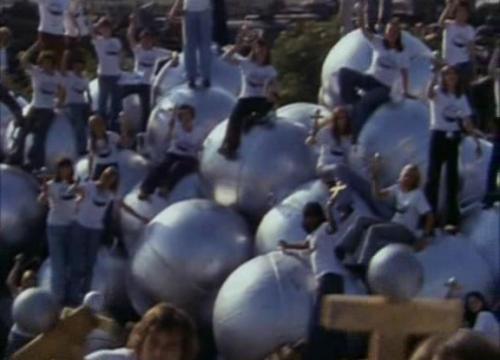
It is the most iconic rock opera ever made, the first example named whenever anyone thinks of rock operas. It is also The Who's most outstanding achievement; while they could and would top this work in later years, Tommy is still the benchmark against which all their later works are compared. We already murmured about Tommy last year on the event of director Ken Russel's passing, but we promised ourselves that we would give Tommy its due.
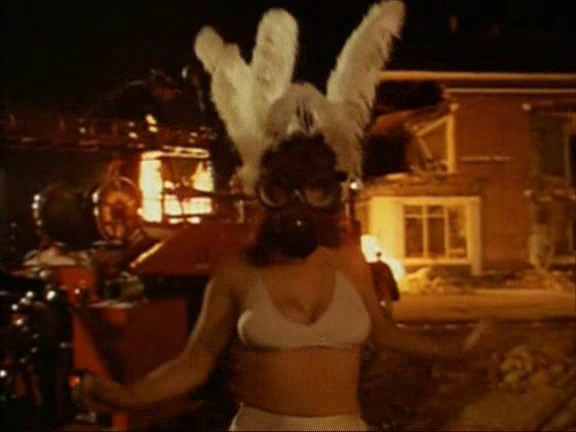
Tommy also got very lucky in escaping the fate of Sgt. Pepper's Lonely Hearts Club Band (the movie, not the album or song), which also had an all-star cast and high production values and in fact shared a producer with Tommy, namely Robert Stigwood. How's that for dodging a bullet? Since Stigwood and Ken Russel produced Tommy together in 1975, and then Stigwood went solo to produce the train wreck Sgt. Pepper's, we know who the Garfunkel of that team was, don't we?
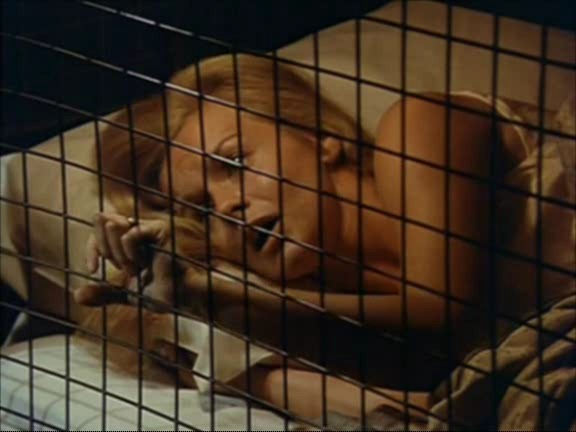
And oh, what a cast! It's a shame to name names here, because some of the supporting roles are such a delightful surprise when they pop up. Jack Nicholson is in this! OK, he really can't sing well, and his role isn't really much more than a plot device, but still, The Joker! And then there's Tine Turner, who steals the show and runs for the hills with it in her role as the Acid Queen, finishing up her song with an echoing witchy laugh that is guaranteed to send shivers down your spine. And yes, that is Eric Clapton in a Jesus-freak getup strolling down the aisle in church - who else would it be? Heck, Elton John is in this and you almost forget about him, even though his part is one of the centerpieces of the film.
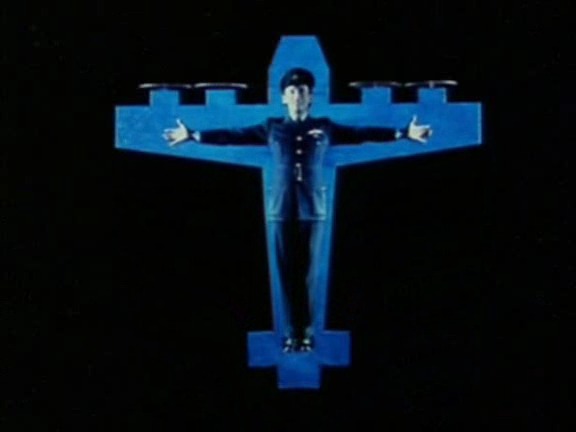
Now, you will find some spoilsport critics out there who say derogatory things about this film. That it is too bombastic, too over-the-top, that it is an indulgent orgy of excess. We think those critics are wet blankets. With a work this epic, sometimes it's best to either go big or go home. In this film, everybody from the top star to the lowest extra breaks their back to give 110% effort in entertaining the daylights out of you, and as a result, we're still raving about it 35 years later. Even Oliver Reed, in his heavy duty as one of the leads, manages to at least do a decent job of singing and is given material that just about matches his skill. Ann-Margaret, of course, throws herself into it with the ferocity of a tigress. Or... like a "kitten with balls" as Cameron Diaz describes her in 1996's Feeling Minnesota.
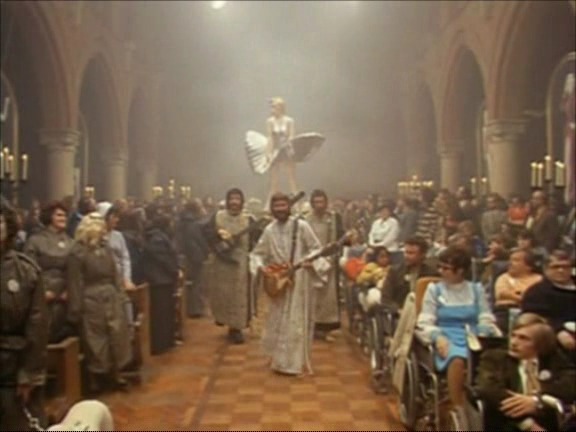
We might as well sketch the plot: Tommy is a boy who is born as the son of a Royal Air Force Captain. Shortly afterwards, his dad gets shot down over the battlefield and is presumed dead. His mom later re-marries Frank, who takes Tommy on as a benevolent step-dad, but trouble looms when Captain Walker, his missing dad, suddenly returns home and startles the whole family. Frank accidentally kills Walker, and the horrified mother and step-father get all up in Tommy's face telling him that he didn't see it or hear it, and he'll never tell anyone about it. Tommy's reaction is to get a little brainwashed by the incident, staying in shock throughout his childhood as he becomes blind, deaf, and mute. His mom and step-dad then try to cure this and give him a reasonably happy childhood anyway. To tell more would be to spoil the plot, if that's possible, but suffice it to say that we're going to wade through swamps of both Freudian and religious symbolism before we get to the end of Tommy's story.
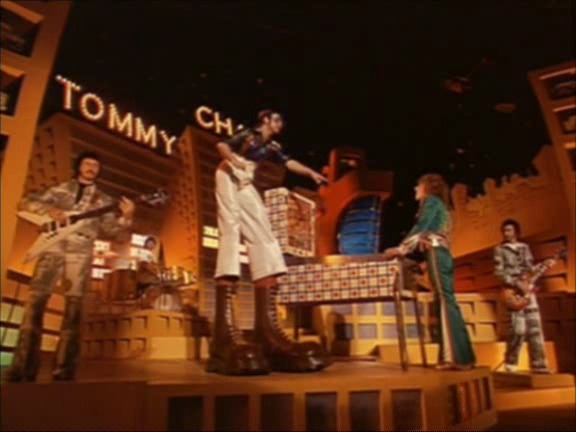
We're also going to have our minds blown with some extremely trippy scenes, and our wits sharpened by some extremely wicked social and religious satire. After all, this is a Ken Russel movie. But it bears rewatching, so you can appreciate such clever props as that combination streetcar, organ, and cash-register and the working of the pinball and the letter "T" into a cross shape, giving the story its iconic logo.
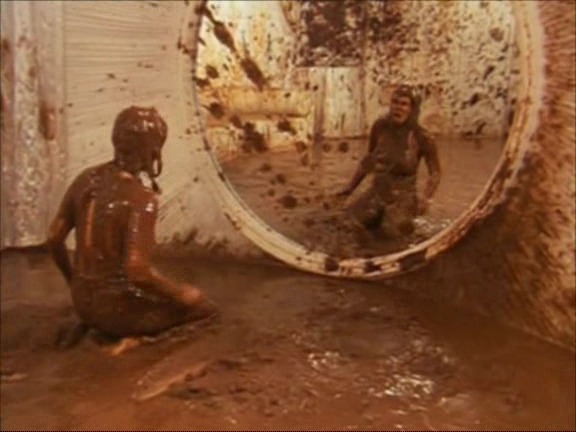
Unlike many rock operas, the plot is very-well structured and told. New songs were written specifically for this film, which helps a lot, as opposed to the album, where it's a lot harder to piece together the story at its heart. The crazed imagery and hyper atmosphere nevertheless serves to illustrate the story... for the most part. You don't get lost often, although you might have to mull over some scenes a tad.
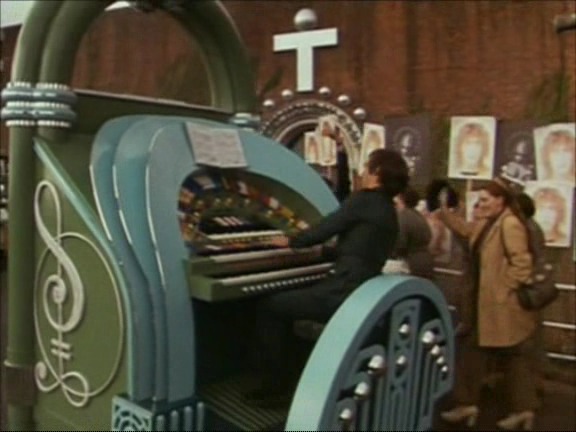
All in all, Tommy is not an easily forgotten experience. It is at least one movie that helps to save the rock opera from the fate of disco.

 Buy the Soundtrack, Skip the Movie: Brainscan (1994)
Buy the Soundtrack, Skip the Movie: Brainscan (1994)  Let’s Go to the Hop - Ignore That Door’s Four Bunnie...
Let’s Go to the Hop - Ignore That Door’s Four Bunnie...  Forgotten Weird Music Videos of the Ancient 80s | vol 3
Forgotten Weird Music Videos of the Ancient 80s | vol 3  Forgotten Weird Music Videos of the Ancient 80s | vol 2
Forgotten Weird Music Videos of the Ancient 80s | vol 2  Forgotten Weird Music Videos of the Ancient 80s | vol 1
Forgotten Weird Music Videos of the Ancient 80s | vol 1  Let’s Chase Taylor Swift Rumors
Let’s Chase Taylor Swift Rumors  When the Beatles Touched Off a Movie War
When the Beatles Touched Off a Movie War  When Mike Bloomfield Composed a Soundtrack For Andy ...
When Mike Bloomfield Composed a Soundtrack For Andy ...  Yet Another List of Bad Song Covers
Yet Another List of Bad Song Covers  Why Does Everybody Pick On Liberace?
Why Does Everybody Pick On Liberace?  Trainspotting Soundtrack Revisited : One of the Best...
Trainspotting Soundtrack Revisited : One of the Best...  Nicki Minaj and Megan Thee Stallion: Bringing Back t...
Nicki Minaj and Megan Thee Stallion: Bringing Back t...  Quirky Songs About Los Angeles
Quirky Songs About Los Angeles  Penguin Pete’s Obligatory Penguin Cafe Orchestra Post
Penguin Pete’s Obligatory Penguin Cafe Orchestra Post  Heart | How Bad Are Those Animals?
Heart | How Bad Are Those Animals?  That Time Ronnie James Dio Saved Black Sabbath’s Bacon
That Time Ronnie James Dio Saved Black Sabbath’s Bacon  What is a Left Hand Path? - Entombed and Swedish Dea...
What is a Left Hand Path? - Entombed and Swedish Dea...  Song Analysis Corner: Convoy (1975)
Song Analysis Corner: Convoy (1975)  What’s Up With Margaritaville?
What’s Up With Margaritaville?  This Album Links Duran Duran, Andy Warhol, and Kurt ...
This Album Links Duran Duran, Andy Warhol, and Kurt ...  Your Back-To-School Playlist
Your Back-To-School Playlist  Cucumber Castle | the other Bee Gees Movie
Cucumber Castle | the other Bee Gees Movie  Danny Elfman Scores New Film; Other Movie Weirdness!
Danny Elfman Scores New Film; Other Movie Weirdness!  Sparks Is Not Crying in Their Latte
Sparks Is Not Crying in Their Latte  Travis Scott : Rapper, Cannabis Entrepreneur, Filmmaker
Travis Scott : Rapper, Cannabis Entrepreneur, Filmmaker  Anders Runestad – Author and Music Blogger
Anders Runestad – Author and Music Blogger  What If They Really ARE Giants?
What If They Really ARE Giants?  Prince’s Underrated Under the Cherry Moon
Prince’s Underrated Under the Cherry Moon  Six Degrees of Blondie
Six Degrees of Blondie  Six Degrees of: Adam and the Ants
Six Degrees of: Adam and the Ants  Discovering Beat-Club | Vintage West German Music Show
Discovering Beat-Club | Vintage West German Music Show  Eurovision Contest Winners part 2
Eurovision Contest Winners part 2  Song Analysis Corner: Snoopy vs. the Red Baron | The...
Song Analysis Corner: Snoopy vs. the Red Baron | The...  Eurovision Contest Winners part 1
Eurovision Contest Winners part 1  KISS SUXX!
KISS SUXX!  You Haven’t Met Your Last Reefer Man
You Haven’t Met Your Last Reefer Man  Ruth Underwood and the “Zappa sound”
Ruth Underwood and the “Zappa sound”  Catchy Commercial Earworms | vol 2
Catchy Commercial Earworms | vol 2  Song Analysis Corner: “Trouble Every Day” | Frank Zappa
Song Analysis Corner: “Trouble Every Day” | Frank Zappa  Blues Music For Your Great Recession
Blues Music For Your Great Recession  We Can Fix America If We Just Bring Back Schoolhouse...
We Can Fix America If We Just Bring Back Schoolhouse...  Song Analysis Corner: Istanbul (Not Constantinople)
Song Analysis Corner: Istanbul (Not Constantinople)  Music To Shoot Down UFOs To
Music To Shoot Down UFOs To  Are You Ready For AI Music?
Are You Ready For AI Music?  How Dreary Was 1970s Adult Contemporary?
How Dreary Was 1970s Adult Contemporary?  I Just Called To Say Stevie Wonder's Song Deserved a...
I Just Called To Say Stevie Wonder's Song Deserved a...  "Knock On Wood" | The Real Song To Remember From Cas...
"Knock On Wood" | The Real Song To Remember From Cas...  Dr. Dre's Not Gonna Take This Anymore
Dr. Dre's Not Gonna Take This Anymore  Apache - The Shadows | A Surf-Rock Safari
Apache - The Shadows | A Surf-Rock Safari  New Year : New Music Artists You (Probably) Haven't ...
New Year : New Music Artists You (Probably) Haven't ...  Song Odyssey | I Put A Spell on You
Song Odyssey | I Put A Spell on You  KMart and S.S. Kresge | Music Mystery?
KMart and S.S. Kresge | Music Mystery?  Did I Ever Introduce You To Horrorpunk?
Did I Ever Introduce You To Horrorpunk?  Song Analysis Corner : The Coffee Song
Song Analysis Corner : The Coffee Song  Duran Duran Finally Got Inducted
Duran Duran Finally Got Inducted  That Time Taylor Swift Broke Ticketmaster
That Time Taylor Swift Broke Ticketmaster  Parody Songs and Lawsuits | Of Interest To Aspiring ...
Parody Songs and Lawsuits | Of Interest To Aspiring ...  Worst Band Spats
Worst Band Spats  Rock and Roll Bookshelf | Corey Taylor's Seven Deadl...
Rock and Roll Bookshelf | Corey Taylor's Seven Deadl...  Lizzo, the Flute, and Racist-Sexist Republican Fallout
Lizzo, the Flute, and Racist-Sexist Republican Fallout 